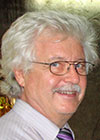Plenary Speakers

Biography
Professor Gerben BRUINSMA
Research on trust in the criminal justice system
The majority of research in criminology on trust in the criminal justice system is primarily based on surveys. Almost all governments in democratic nations regularly measure levels of trust in the government and in the criminal justice system. These surveys describe the attitudes of the residents about the police, sentencing practices, or kind of punishments. They also explore variations in attitudes between various groups in society, structured by e.g., gender, age, ethnicity or social class. Although the findings are mostly interpreted assuming that more trust leads to more legitimacy and compliance and a more effective criminal justice system, there is little criminological research that has rigorously tested this assumption. In addition, the surveys have to contend with methodological problems (high non-response, biased samples, unknown and changing yardsticks), some of which have become more serious over the last decades.
In this lecture I will argue in support of other kinds of research to test specific propositions or to gain in-depth insight into the underlying mechanisms that cause trust. Specifically, the focus of research should be more on the behavior of citizens instead of the opinion of the people. For that reason other research designs such as field or natural experiments are needed. NSCR has carried out a number of quasi-experimental studies showing for instance that situational characteristics play an important role in supporting vigilantism, that attitudes towards the system are not always correlated with the actual behavior of people towards the system, and that level and type of information given to citizens about the justice system have substantial effects, sometimes even closing a trust gap. These studies demonstrate that criminology can benefit from the use of non-survey designs to study trust in the criminal justice system.
Finally, I will suggest a future research agenda to facilitate empirical testing of theories on trust in the criminal justice system by studying the effects of new technologies on the behavior of citizens. In criminal law and criminology, technological devices and developments are often perceived as a threat to the freedom of individuals, especially in countries where human rights are not guaranteed by a democratic system. This might indeed be a danger for many because the routine application of these technologies by the police or intelligence enables citizens to be followed, traced, filmed and bugged wherever they go, and their computers and tablets to be copied without their consent or even their knowledge. Now more than ever in history, government has the power to check and supervise their own residents or visitors.
The other side of the coin however is that criminologists can use these technologies as data sources in order to study the confidence and trust in the criminal justice system. The use of these devices by people can be measured as actual behavior that is pro or cons the system. Face book, Twitter, texting and mobile telephone can be explored as sources of information to study the actual support for or criticism of the criminal justice system. Furthermore, criminologists can study better than ever if, and how citizens actually help the police to solve crimes (as in the case of the Boston bombers). I will discuss opportunities and pitfalls, as well as pros and cons of such a use of modern technology for research purposes.
Professor Gerben BRUINSMA is director of the Netherlands Institute for the Study of Crime and Law Enforcement (Amsterdam, the Netherlands), a national research institute of the Netherlands Organization for Scientific Research (NWO), and professor of Environmental Criminology of the VU University Amsterdam.
Biography
Professor David GARLAND
Cultures of Control and Penal States
"The Culture of Control" was one of several efforts to diagnose and explain changing patterns of crime control and punishment at the end of the 20th century. And the critical discussions that followed on from these efforts have taught us a great deal about the social forces that pressed for the expansion and intensification of penal and social control. As the scholarship in this field grows more sophisticated and more comparative, we face some choices about research strategies and priorities. In this presentation, I argue that there are good reasons to bring the (variable) character of penal states to the foreground of analysis and I outline a basis for analyzing the penal state and its deployment of the power to punish.
Professor David GARLAND is Arthur T. Vanderbilt Professor of Law and Professor of Sociology at New York University and a visiting professor at Edinburgh University. He is the author of Punishment and Welfare (1985), Punishment and Modern Society (1990), and The Culture of Control (2001), the founding editor of the journal Punishment & Society and the editor of Mass Imprisonment: Social Causes and Consequences (2001) and, with Richard Sparks, of Criminology and Social Theory (2000). His most recent books are America’s Death Penalty: Between Past and Present (edited with R. McGowen and M. Meranze, 2010) and Peculiar Institution: America’s Death Penalty in an Age of Abolition (Harvard, 2010). He is currently writing a short sociological introduction to the welfare state.

Biography
Professor Mike HOUGH
Trust, legitimacy and compliance: A European test of procedural justice theory
How best to get people to comply with regulations is a specific example of the broader human question about ways of achieving cooperation. Procedural justice theory offers some useful insights into how the institutions of justice can secure public compliance and cooperation. This lecture will contextualize procedural justice theory within a range of theories about compliance and cooperation, and will summarize findings from the fifth (2010) European Social Survey on trust in justice. This included a module on this topic, designed by colleagues and myself working on an EU project, Euro-Justis. The findings provide good support for the basic procedural justice thesis that fair and respectful treatment of the public by justice officials builds trust in the police and the courts, fosters institutional legitimacy and thus secures public cooperation and compliance with the law.
I shall argue that the results provide a reliable foundation for policing and penal policies that attend more closely to public perceptions of legitimacy. But I also propose to review the methodological limitations of this work, the political risks associated with such policies, and the practical problems in securing buy-in to these policies by those such as front-line police officers who are required to put them into effect.
Professor Mike HOUGH is Co-Director of the Institute for Criminal Policy Research, School of Law, Birkbeck, and University of London. He started his career as a government researcher, and set up an academic policy research centre in 1995, which moved to Birkbeck, University of London in 2010. Mike's research interests include: procedural justice theory and public trust in justice; public perceptions of crime and justice; policing and police legitimacy; crime measurement and crime trends; anti-social behaviour and its regulation; sentencing and sentencing guidelines; offender rehabilitation and desistance (and its evaluation).

Biography
Professor Susanne KARSTEDT
Europe as a normative power: Cultural peers and penal policies
Since the end of World War II, European values have been decisive in defining human rights and justice, and shaping normative arguments on which penal policies are based. As Europeans position themselves as ‘normative power’ globally, and shape criminal justice they are seen and see themselves as ‘cultural peers’. However, penal policies, imprisonment and prison conditions simultaneously converge and diverge within Europe, and its penal landscape is marked by deep divides. Which values and cultural patterns are seminal in creating Europeans as ‘cultural peers’ in penal policies? In which ways are these values operative in the penal institutions of clusters of cultural peers within Europe? Do they create a ‘European way of justice’ and establish Europe as a normative power? These questions will be explored in a cross-cultural analysis for the cultural space and the spatial context of both nearness and distance in Europe.
Professor Susanne KARSTEDT is a Professor of Criminology and Criminal Justice at the University of Leeds, United Kingdom. Before moving to the UK in 2000, she taught and researched at the Universities of Bielefeld and Hamburg in Germany. She has researched and written widely on international and comparative criminology, and on globalisation, crime and justice. Her cross-cultural and cross-national studies of crime cover a broad range of topics, from middle-class crime to organsied crime, and from interpersonal violence to state crime. Her comparative research on justice looks into the role of democratic values, solidarity and inclusion in contemporary punishment. Her present focus is on mass atrocity crimes and international and transitional justice, and she co-chairs with Joris van Wijk, VU Amsterdam, the European Criminology Group on Atrocity Crimes and Transitional Justice, the most recent addition to the ESC working groups. She was the recipient of the Christa-Hoffmann-Riehm Award for Socio-Legal Studies in 2005, and the Sellin-Glueck-Award of the American Society of Criminology in 2007.

Biography
Professor Klára KEREZSI
Challenges of Criminality in Hungary: Anything New Under the Sun?
Is it true, that crime is always increasing? The answer is “YES” if you ask the ‘everyday citizen’, but it is “NO” if you ask a professional. Starting from the basic facts about crime and criminality in Hungary, the presentation is divided into three main parts.
The first part looks at data-sets from both administrative and survey-based collections arguing that the examination of the ‘overall’ crime rate hardly gives any help to shed light on the possible causes of the different crime trends. The author demonstrates that much of the public concern about increase in crime-rate has been generated by over-simplified interpretations, as well as the factors underlying changing crime rate during the past three decades has remained poorly understood.
The second part highlights some social science data and other factors make crime rates rise and fall over time, and could influence social peace in the country. The presentation offers a much broader understanding of the profound changes that have occurred in Hungarian society from the beginning (or even before) the transition period.
The third looks at the contemporary professional and political debates over criminal ‘underclass’, bearing in mind the historical antecedents of the issue by linking both poverty and criminality, as well as its linkage to the workhouse-prisons system in the beginning of the 20th century. The presentation deals with the Hungarian poverty problem (especially Roma poverty), pointing out, that the focus of interest in poverty has come to be cultural and moral rather than social.
As a conclusion the author summarizes what crime figures and social data should tell to the professionals, the policy makers, or the general public so as to develop effective policies for crime prevention and control.
Professor Klára KEREZSI is Senior Researcher of the National Institute of Criminology, from 2006 to 2012 she was the deputy director of the NIC. She is an Associate Professor of ELTE University, Faculty of Law, teaching criminology, including research methods, victimology, and probation studies. Her research interests and publications relate to areas of crime prevention, crime control policies and community sanctions. In 1996 she was engaged to elaborate the first national crime prevention concept, and in 2002 she helped to work out a crime prevention strategy which was approved by the Parliament as the National Crime Prevention Strategy. She is a member of the editorial boards of European Journal of Probation and Acta Facultatis Politico-iuridicae Universitatis Scientiarum Budapestinensis de Rolando Eötvös Nominatae. She is member of the Scientific Committee of the International Society of Criminology and vice president of the Hungarian Society of Criminology.

Biography
Professor Hans-Jürgen KERNER
Relationship among crime, criminology and criminal policy: Thoughts about an as challenging as intricate issue in the history, and for the present situation and the future of our discipline
The late Edwin H. Sutherland was for many decades one of the internationally most influential scholars of the sociology of crime and crime control. Nevertheless, he chose nothing but the term “Criminology” for the 1st edition of his textbook which appeared as part of the Lippincott Series in Sociology in the year 1924. The first Chapter on “Criminology, Law, and Crime” started with the following sentences: “Criminology is the body of knowledge regarding the social phenomenon of crime. It includes information regarding the nature and extent of crime, and the policies used in dealing with crime and criminals”. The second sentence was in later editions more sharply and catchy rephrased as “It includes within its scope the processes of making laws, breaking laws, and reaction to the breaking of laws” followed by the sentence that these processes “are three aspects of a somewhat unified sequence of interactions”. The presentation will posit that still today this definition/description can be used as a conceptual starting frame for dealing with “processes” leading to “conditions” leading themselves then rather to “facts” instead of “data” in the area of crime and criminalization. The U.S. legalistic term of “law enforcement” is (probably unwittingly in the core) conceptually quite near to the “reaction to the breaking of laws” whereas such terms as “war on crime” or “war on criminals” may lead us faster to the other crucial juxtaposition of (criminal) law as a tool/weapon of establishing and upholding (political) power on the one hand, and law as a means to restrict (political, executive, and judicative) power, in particular abuse of power, on the other hand. The aspects of “crime as construct” vs. “crime as harm and damage generating behaviour” cannot be fully separated from each other in any scientific approach which aims to study, understand or explain the full range of influences upon resp. consequences of human deviant behavior and institutionally embedded misconduct. The presentation will try to show, however, that in everyday “normal criminological science” many phenomena can be taken “as if” they were “given entities”, due to agelong common public understanding of conducts deserving to be reacted upon in a “penal” manner. In many other respects, even in democratic states or societies, the apparent natural order of sequence from crime to criminal policy to criminology deserves to become turned around and theoretically deconstructed alike. Socalled political or moral (sexual) or terroristic crimes are but pivotal examples on the surface for many other “crimes” where criminology might or should contribute (even through empirical studies) to restricted and rationally controlled policies of law making and law enforcing.
Professor Hans-Jürgen KERNER is Emeritus Professor since October 1, 2011, and Senior Professor at the University of Tübingen from November 2011 until December 2014. Before he was Director of the Institute of Criminology, and full Professor at the Faculty of Law, University of Tübingen (Germany), with special responsibility for the fields of criminology, juvenile (penal) law, corrections (including prison law), and penal procedure. He was coordinator of the post graduate LL.M.-Programme of the Faculty of Law for foreign law graduates. Apart from his work at the university, he engages respectively holds positions in a couple of national and international associations. He formerly held positions in Council of Europe, several German universities, at the High Court of Appeal of the State of Hamburg; German Association for Court Aid, Probation and Parole Assistance. Prof. Kerner was president, now honorary member of the International Society for Criminology (ISC-SIC). Visiting Professor/Fellow at the Universities of Southampton, Beijing, Pennsylvania, Melbourne, and Cambridge. He is author, co-author, editor and co-editor of numerous books and articles, including some on victim-offender-mediation and on restorative justice.

Biography
Professor Miklós LÉVAY
Of Hungarian Criminology and Development of Criminal Policy since Changing the Regime in 1989-1990
At the beginning of the lecture I will refer to the changes in Hungarian higher education concerning Criminology, such as the establishment of the master`s program 2011, which may have impacted the existing features of the discipline.
A significant part of the lecture deals with the development of criminal policy in Hungary after the political transformation of 1989-1990. The presentation interprets the features of Hungarian criminal policy, particularly penal policy and sentencing practice over the 20 past years, along with the changes therein.
The essence of these changes is illustrated by the following two sets of data, as well as the governmental perceptions of regarding these data:
The imprisonment rate per 100 000 inhabitants decreased significantly alongside growing crime rates by 1995. (1988: 193, 1995: 121) In 2011 the imprisonment rate is 173 alongside stagnating crime rates. A lower imprisonment rate had been a priority for governments in the early 1990`s, for the present government however, the focus has shifted to a high prison population.
In my presentation I will argue that the nature of the political regime, as well as the governmental system fundamentally determines the characteristics of criminal policy. The latest developments in the field of penal policy indicate that the reaction to crime has become a political issue in Hungary. The word „policy” in penal policy has changed to „politics” in Hungary (as well). The lecture will cover the most prominent facts supporting this conclusion (such as the process of developing the new Penal Code).
Professor Miklós LÉVAY is Professor of Criminology and Criminal Law and head of the Department of Criminology at Eötvös Loránd University, Budapest. He is also judge of the Constitutional Court of Hungary. Between 1981 and 2006 Miklós worked for the Institute of Criminal Justice, Faculty of Law, University of Miskolc. He was the President of the ESC in 2010-2011. Miklós’s research interests: social changes, crime and criminal justice in Central and Eastern Europe; constitutional limits of criminalization and sentencing; comparative drug policy. Some of his most important publications available in English, e.g. Penal Policy, Crime and Political Change, in A. Selih, and A. Zavrsnik (eds.) Crime and Transition in Central and Eastern Europe (Spinger, 2012).

Biography
Professor Irena RZEPLIŃSKA
An evergreen or forgotten subject: relationship among crime, criminology, and criminal policy
- Crime. How is the picture of crime changing nowadays? How do the phenomena of criminalization and decriminalization proceed? At present, we can observe a fall in reported crimes, at the same time we know that crime has appeared in virtual space, in the internet, where crime is not easily detected. What the crime of the internet society, societies of the digital world, dependant on technologies, “workless” societies, and societies of older people (50+) will look like? What the new type of the perpetrator will be?
- Politicization of the problem of crime is not a new phenomenon. In the communist regime, “fight with crime” was an element ever present in political documents as a task of the sole ruling party, meant to obtain the support of the society. In democratic system, “coping” with crime is one of the duties of the ruling class but the issue of crime control also became the subject of political fight on the populist note. “Fight with crime”, or rather as it is said nowadays “crime control” will always be of an interest to politicians – so that the shape and tools of this control are not decided by the voting mechanism.
- Contemporary democratic societies respond to crime with penal sanctions of deprivation of liberty (imprisonment), restriction of liberty (probation with various forms of control), and fines. In post-communist countries of the EU the level of imprisonment is very high, crime policy remains repressive in spite of the decrease in crime level which, among other European countries, is average. How should crime control policy and, at the same time, social awareness of reaction to perpetrators be changed in the post-communist societies?
- The tasks of criminologists. Observation of crime at present, changes of its structure and dynamics, forecast of changes in the picture of crime. Investigation of etiological factors of crime in contemporary societies: factors of its increase and decrease. Investigation of new types of perpetrators. Analyses of, so called, effectiveness of the criminal justice system; supplying the decisive persons with reliable knowledge of the state of crime and methods of response to crime; of the consequences of various political-criminal decisions. Investigation of actions to prevent crime.
Professor Irena RZEPLIŃSKA is Professor of law and criminology in Department of Criminology Institute of Law Studies Polish Academy of Sciences and in Warsaw University. She is author of research on deviance, self-report study, crime and crime policy – historical and contemporary, foreigners’ crime in Poland and, in the last years: youth crime – past and present. At the Warsaw University, Institute of Social Prevention and Resocialization, she is teaching classes on criminology and human rights. Irena Rzeplińska is an editor in oldest polish criminological journal - Archives of Criminology. In Helsinki Foundation of Human Rights – non-governmental organization – she is an expert in refugee and migrants’ law. From 2004, Irena Rzeplińska is a Vice-Director in Institute of Law Studies Polish Academy of Sciences.
Biography
Dr. Sappho XENAKIS
The Missing Level of Analysis: The International in the Study of State Punitiveness
Criminological research into state punitiveness has typically focused either on particular local and national environments or on the international comparison of national trends. Whilst both approaches have contributed important insights to the understanding of levels and patterns of punitiveness in various jurisdictions and regions around the world, there has been relatively little appreciation to date of the ways in which the international environment may itself impact upon national-level penal policies and practices. Drawing on theory from International Relations and Sociology, this talk considers how the international as a level of analysis may further criminological understanding of state punitiveness.
Dr. Sappho XENAKIS is Lecturer in Criminology at the School of Law, Birkbeck College, University of London. Prior to taking up her position at Birkbeck, Sappho held Marie Curie Fellowships at the Centre for Sociological Research on Law and Penal Institutions (CESDIP) in Paris and at the Hellenic Foundation for European and Foreign Policy (ELIAMEP) in Athens, and was an LSE Fellow in International Relations at the London School of Economics and Political Science. She holds BSc and MSc degrees in International Relations from the LSE and a DPhil in International Relations from the University of Oxford. Her main research interests are the politics of international co-operation against corruption, transnational organised crime and political violence, and political economy approaches to crime and punitiveness. In 2011, she won the Young Criminologist Award of the European Society of Criminology. She is currently working on a monograph, The Politics of Organised Crime: Theory and Practice.

Biography
Dr. Damián ZAITCH
Researching Transnational Organized Crime: what data, what methods?
Despite shifts in political and research agendas, there is still a sustained interest in old and new forms of transnational organized crime by scholars from many disciplines, policy makers and law enforcement agencies. For the last 25 years, research on TOC has kept growing as reflected in several scientific journals, thick European handbooks, official reports of all sorts, and various best-selling books. But the phenomenon still poses a major challenge for empirical researchers, as it is often hidden, fluid, dangerous or just a rhetorical device. This contribution will critically assess the type of data and methods used by different TOC researchers or publications, showing their flaws, limitations and potential advantages. Some Innovative strategies, mainly by younger researchers, suppose a welcome counterweight in a field still largely dominated by journalists, law enforcement experts and 'quick and dirty' report writers.
Dr. Damián ZAITCH (1966) is since 2009 associate professor at the Willem Pompe Institute for Criminal Law and Criminology, Utrecht University. From 2000 to 2009 he was assistant professor at the Department of Criminology, Erasmus University Rotterdam. He has researched and published on social control and terrorism, police cooperation in Europe, critical criminology, and for the past 15 years on organised crime, drug trafficking and drug policies in the Netherlands and Latin America. He obtained his PhD (2001, cum laude) at the University of Amsterdam, with an ethnographic research on Colombians involved in the cocaine business in the Netherlands (Trafficking Cocaine (2002), Kluwer Law International) for which he obtained the Willem Nagel Prize in 2003. Since then, he has conducted qualitative research on drug smuggling in the port of Rotterdam, synthetic drugs markets in Amsterdam, virtual hooliganism, and the demand of women trafficking. He is currently interested in new forms of cross-border transnational organised crime, on state and corporate crime against the environment (food industry, exploitation of natural resources) and on innovative qualitative research methods and fields such as virtual ethnography and visual criminology. He coordinates at Utrecht the Erasmus Mundus Doctorate in Cultural and Global Criminology.

Biography
Dr. Aleš ZAVRŠNIK
Surveillance under the rule of law and the rule of financial markets
Technical forms of surveillance, enabled by developments in microelectronics, databases and computer networks, have increased the monitoring of our daily lives and triggered a surge in “surveillance studies”. Their central concern has been “digitalized” surveillance that allows agencies to accumulate, preserve and organize data much more efficiently, creating sensitive personal data databases and using tools such as “data mining” for fishing expeditions and “predictive software” to forecast crimes yet to be committed. This has led to legitimate concerns about systematic undermining of the rule of law, but has somehow neglected the role played by the rules imposed by the financial markets. New “pre-emptive” orientation in the security and control domain protect environments characterized by social, political and economic inequalities and reinforce the conditions already at work there, to the detriment of social equality, justice and social cohesion. The paper will focus on the contemporary socio-economic developments in Central and Eastern Europe and show that the post-socialist transition has been a mixed blessing in terms of proportionate and legitimate surveillance. Besides signs of progress, e.g. the submission of the intelligence services to the rule of law and adoption of legislation regulating the access to public information, there have been signs of the posite, e.g. the systematic undermining of the state’s abilities to enforce the rule of law, a failure to modernize the criminal justice system, a failure in establishing strong market regulatory agencies and erosion of public trust in the criminal justice system. The paper will try to show how the European Union itself, which Central and Eastern European countries aspired to join, has moved towards surveillance regimes that stir authoritarian memories in nations whose socialist past is being systematically demonized.
Dr. Aleš ZAVRŠNIK (1977) is a researcher at the Institute of Criminology at the Faculty of Law in Ljubljana and Assistant Professor at the University of Ljubljana, Slovenia. He was a postdoctoral Yggdrasil fellow of the Research Council of Norway at the University of Oslo (2012), a postdoctoral fellow at the Max-Planck Institute for Foreign and International Criminal Law (Freiburg i. Br., 2009) and a fellow of the World Federation of Scientists (Geneva, 2008). His areas of interest include theoretical criminology, law and technology, cybercrime, and surveillance. He collaborated in the European Cooperation in Science and Technology (COST) Action IS0807 “Living in Surveillance Societies” and the COST Action IS0801 “Cyberbullying”. He co-edited a book Crime and Transition in Central and Eastern Europe (New York: Springer, 2012) and Crime and Technology: How Computers Transform Surveillance and Privacy, Crime and Crime Control? (Ljubljana: Institute of Criminology, 2010). He organised an international conference “Spy in the Sky: Regulatory Issues of Drones and Unmanned Aerial Systems” (Ljubljana, 2013), an International colloquium “Living in (Un)regulated Surveillance Society?” (Ljubljana, 2010) and a conference “Cybercrime and Digital Forensics” (Ljubljana, 2009).










